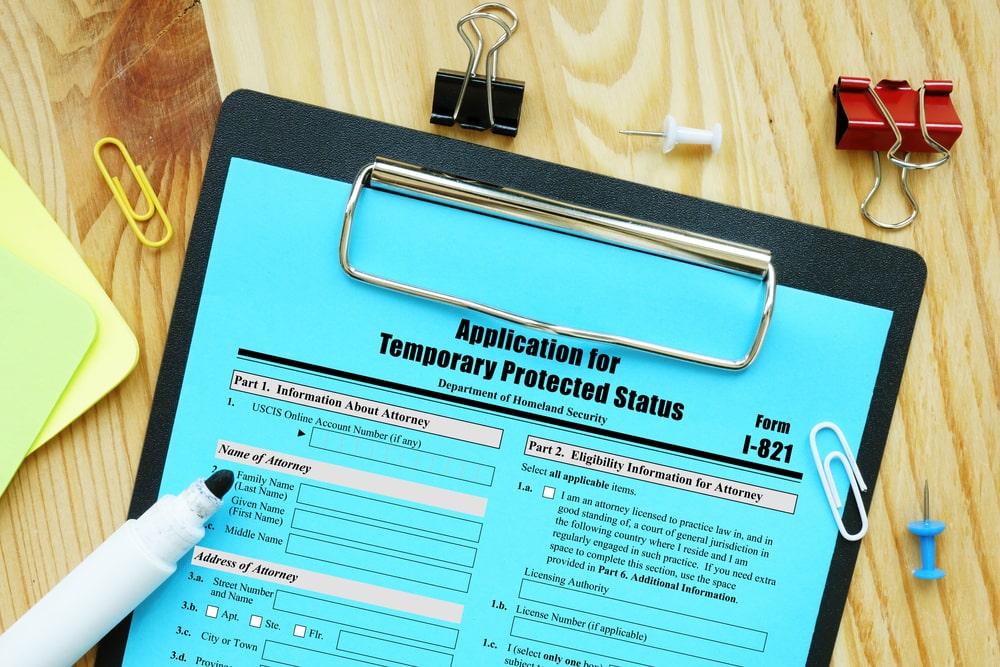Table Of Contents
- Temporary Protected Status for Ukraine
- Temporary Protected Status for Afghanistan
- How Long Does a TPS Designation Last?
- Need Help with TPS in California?
War and internal turmoil leaves many countries around the world grasping for international support while their citizens flee to survive. Though grim, this is a common occurrence. Even in the modern world, millions of people have been displaced from their generational homes due to chaos and conflict. As we’re well aware, there has been ensuing political and violent disruption in Ukraine and Afghanistan. This has left millions of people homeless and vulnerable in their own home countries.
Those who have managed to get away safely are counting on nations like the US to lend them a helping hand. As a result, temporary protected status has been assigned to people from Ukraine and Afghanistan by the United States of America. If you’re from one of the two nations and currently residing in the US, you need to be aware of what TPS is and how it can help you.
What is TPS?
Temporary Protected Status, generally referred to as TPS, is a special status designated to individuals born in foreign countries who are unable to return to their nations due to certain circumstances. As the name suggests, the status thus allocated is temporary. Additionally, the circumstances so pertained make it difficult or unsafe for the foreign nationals to travel back home.
This limited period immigration status was first introduced in the 1990 Immigration Act. Since then, TPS has enabled millions of displaced citizens regain a sense of normalcy and safety in their lives. It also allows innocent victims to make a living – with dignity and away from unnecessary violence. Ukraine and Afghanistan are the newest nations added to the TPS list, which already supports members like Sudan, Yemen and Burma.
Temporary Protected Status for Ukraine
The nation of Ukraine has been caught in an ongoing turmoil for months now with its huge neighbor, Russia. Since the latter’s military attack on Ukraine, millions of Ukrainians have fled to the neighboring European countries. Some have even crossed the ocean to seek haven in the United States. As Russia began capturing and attacking major cities, people had no choice but to leave their underground shelters.
In these trying times, the smallest humanitarian aid can go a long way in saving innocent lives. The Biden administration has therefore allocated a temporary protected status to all Ukrainian nationals currently in the United States, subject to certain conditions. Only those people would be eligible for the designation who arrived here on or before March 1, 2022. The residency should be continuous and proved while applying for the status which will last a total of 18 months.
Temporary Protected Status for Afghanistan
As a result of the government failure and Taliban taking over governance in Afghanistan, thousands of Afghans fled the country. The militant organization’s brutal rule, power abuse and inability to provide necessities to the citizens was the driving factor in mass fleeing of the people. Fearing death and persecution if they were to return, the US government has also designated TPS to Afghan nationals in the United States. This will allow the people to live in security and to seek opportunities to build their new lives until their home nation is safe to return to.
For nationals of Afghanistan, the temporary protected status will be given only to those who have resided in the US continuously before March 15, 2022. Like Ukrainians, individual Afghans also have to meet certain conditions to be granted the TPS.
All You Need to Know About TPS
Now that you know what TPS is and why it has been designated to Ukraine and Afghanistan, it is time to delve into more detail on the same. Since it is a government action and assigned by it, the temporary protected status is much more than a simple formality. There is a certain level of legality and ambiguity attached to the same. This may be a bit tricky for the layman to figure out – especially someone unacquainted with the American public system. Here’s what you need to be aware of, if you’re a prospective TPS designee.
Who Designates TPS?
The Department of Homeland Security is responsible for deciding the temporary protected status for a particular nation. Specifically, it is the Secretary of Homeland Security who has this authority. However, the authority is not completely discretionary.
Before choosing a nation for TPS, the Secretary has to discuss this with other major governmental bodies. After the consultation, the Secretary can decide on their own about the temporary protected status designation. Additionally, during these consultations, the bodies and the Secretary judge whether the nation in question qualifies for the same. TPS is designated to a country on the following basis:
Basis for Allocation of Temporary Protected Status
There are three conditions under the statute, wherein a country may be considered for TPS:
- Ongoing Armed Conflict
Situations like civil war or wars with other nations qualify for TPS under armed conflict. War torn countries are considered unsafe to return back to and the citizens are therefore assigned TPS until such a situation cools down.
- Environmental Disasters
For TPS to be designated under this category, the environmental disaster would have to be nothing less than a catastrophe that affects the quality of life of the entire nation. This type of disruption usually makes it difficult for the nation to accommodate the returning nationals. Plus, the citizens may find it hard to fulfil their most basic needs as a result of the same.
- Extraordinary and Temporary Conditions
This encompasses any unforeseen situation that may arise in a country, which though temporary has substantial effect on the working and livelihood of every person.
Difference Between TPS and Asylum
Both TPS and Asylum are special temporary statuses granted to foreign-born nationals residing in the US. It’s natural to consider that both are the same, but they’re not.
Temporary protected status is assigned to a nation on account of war, natural disaster or other extraordinary condition. This means that every individual (subject to certain eligibility conditions) from that nation can apply for and receive the TPS.
On the other hand, asylum is not granted to a nation as a whole. It takes into account the particular situation of the people applying for the asylum.
Therefore, TPS is granted on a collective basis while asylum is granted individually.
TPS and Permanent Residency
It’s in the name- the former is temporary while the latter is permanent. The temporary protected status provides protection to the foreign individuals for a limited period of time. There is no guarantee when this status may be taken back by the United States government and is entirely upto its discretion.
Permanent residency is granted to people who have fulfilled certain conditions and are then allowed by the government to reside in the United States permanently. There is no time limit on how long a person can reside here once they have been given PR. However, some TPS designees may use their unique circumstances to apply for permanent residency in the future.
TPS Eligibility
As we discussed above, TPS is designated to a nation and can therefore be used by all people that fall under its purview. But there’s a catch. TPS is not automatically assigned to every foreigner of that nation living in the United States. There are certain conditions that must be met for the same:
- The individual should belong to a nation designated TPS by the Department of Homeland Security
- The individual should have continuously resided in the United States since the designation was announced.
- The individual should have continued to reside in the United States since a date specified by the Secretary of Homeland Security
- The individual must pass the background check, not posing a threat of American national security or have criminal background.
How TPS is Awarded
Individuals have to apply for TPS during a period specified by the responsible organization. It is not automatically assigned to every person from the foreign state, it is rather an invitation for them to apply for the same.
After filling the form with the necessary details and proofs of residency, the person also has to pay a fee. Once the payment is done, the form is considered complete and is sent for scrutiny. During this process, the department judges the applications and designated TPS to individuals based on their eligibility criteria.
People usually have to wait just a few months before they receive the TPS.
How Long Does a TPS Designation Last?
Temporary protected status is generally assigned in chunks of periods lasting 6, 12 or 18 months depending on the situation in the home country. TPS designees do not have to worry about their status getting expired. This is because it can be renewed if the department decides that the situation in the home country has failed to improve.
Reregistration for Temporary Protected Status
As we discussed above, the TPS can be renewed by the government if they feel that the situation is inhospitable for returning nationals of the country. Again, even if TPS is renewed, it doesn’t get automatically renewed for every individual living here with the status. You must apply for registration within the specified time period, and failing to do so may lead to deportation.
If you couldn’t apply for registration during the allocated time, it is possible to make and appeal with a good excuse for the same. Once reregistered the TPS will be renewed for another 6, 12 or 18 months.
Benefits of Temporary Protected Status
The temporary protected status has acted as a lifeline for millions of people since its introduction in 1990. It allows the average displaced person to make a life for themselves, even if temporary, in a completely new and foreign country. It secures to the TPS designee protection as an immigrant and allows them to remain safe in this land. Since most TPS designers flee from unfavorable conditions, it is natural for them to not want to return unless their home is safe again. This makes the role of TPS even more important as a tool of humanitarian relief for citizens.
Earning a living is important for survival. Since TPS designees receive no other form of assistance from the government of United States, they are allowed to work like any other immigrant. This means they can secure jobs without have the necessary immigration paperwork. Work and the ability to find jobs in a new country is always a thing of worry for many people and TPS has helped ease this worry for thousands of people.
Simply knowing that you’re safe and secure and would not fall victim to unnecessary violence is enough for being happy. The fact that temporary protected status allows and gives them the opportunity to live free of fear is enough for most people to want this status for them. It has changed millions of lives and will continue to do so.
What Happens at TPS Expiry?
TPS expiry may lead to deportation in the worst case scenario and it is best to not wait for the situation to go this far. However, if it is the government that chooses not to renew the TPS, then the foreign nationals will be sent back to their home country at the earliest.
Need Help with TPS in California?
The immigration attorneys at Yemi Getachew Immigration Law Office understand how difficult it is to settle in a new country, even temporarily. This is especially hard when you’ve fled with nothing but your life and the will to survive. Building a new life here and seeking opportunity is any person’s first instinct and they shouldn’t have to worry about public formalities. But it is also true that these formalities cannot be ignored when they hold the power to decide your future.
It is best to weigh your options and have a professional ready to assist whenever you need. If you have any question about TPS or how to apply for it, you’re welcome to get in touch with us. We’ll get your papers ready, so you can focus on living your life without worrying about deportation.



